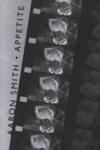Appetite
Appetite, Aaron Smith’s second full-length poetry collection, is wide-ranging, unapologetic, and clever. Its five sections all include references to gay experience, but many poems also focus on popular culture—particularly film—as well as many other topics. The book’s title implies a desire for something, but to me, the dominant emotion of the collection is loneliness; this is not a bad thing, however, and Smith offers the reader a beautiful, thought-provoking journey through many facets of his speaker’s life.
Appetite, Aaron Smith’s second full-length poetry collection, is wide-ranging, unapologetic, and clever. Its five sections all include references to gay experience, but many poems also focus on popular culture—particularly film—as well as many other topics. The book’s title implies a desire for something, but to me, the dominant emotion of the collection is loneliness; this is not a bad thing, however, and Smith offers the reader a beautiful, thought-provoking journey through many facets of his speaker’s life.
The book opens with a section titled “Men in Groups.” The eponymous poem opens the collection with an eclectic list of all the things groups of men do, from the mundane “take their shirts off and chase basketballs” to the mournful “carry caskets.” The poem’s long lines move from the joyfully exuberant (and presumably queer) to the violent and threatening with a rhythm reminiscent of the Beat poets: “Men in groups take their shirts off and dance. Men / in groups carry guns. Are brave. Are cowards. Are solemn and crazy // and lonely.” Other standout poems in the first section include “Psalm (Queer),” one of several psalms in the book, and “Hurtful,” a lovely meditation on language and loneliness. Smith writes:
There are four words
in the English language that have
no rhymes: orange, month, silver,
and purple. I want more than anything
to prove that wrong, and the closest
I’ve come is hurtful.
The second section, “Celebrity Photo,” includes many poems about film, but it opens with a piece only tangentially tied to movies. One of the most powerful and raw poems in the book, “Sometimes I Want a Gun,” is a complex reflection of a speaker who has wrestled with his sexuality. This longer poem includes sections about childhood guilt, thoughts of suicide, the speaker’s parents’ religious homophobia, and his own disgust and anger at the privilege of heterosexual people making out on a train. The final section describes the speaker’s reaction after first masturbating to “a guy in swimming trunks / on the cover of J. Crew catalog.” At 16, he immediately feels guilty and damned to hell and begs God to forgive him. The touching final couplet expresses a different sort of appetite: “I said: Send me a sign to show you forgive me. / I would have called the slightest breeze his presence.”
The book’s center, its third section, is a single long poem called “I Love the Part.” With sharp observations and a tone that shifts easily between humorous and wistful, the poem uses anaphora with the title phrase to describe memorable moments from a wide range of films.
The fourth section, titled “Prodigal,” marks a shift toward a lonelier, older speaker. Most of the anger appears earlier in the book, and most of the active desire as well. The poem “Psalm (Boston)” reveals this through the point of view of a speaker leaving a nightclub after the friends he had come with had “paired off and gone.” He walks home at dawn:
Still jittery from cigarettes,
from pills that promised
escape, I fell inside my body—
the last place I wanted to be.
This loneliness is repeated very clearly in “Prodigal” as the speaker feels out of place in West Virginia, “one of three gay men in a tiny college town.”
The final section, like the collection as a whole, is called “Appetite,” as is the poem that begins the section. The poem details the speaker’s youthful recklessness, focusing on a summer of “Dance / music and AIDS tests / and married men.” The last three poems of the collection move to the present and all deal with loneliness in some way, with wanting something to change, wanting the handsome stranger to look at you. The penultimate piece, “West Side Highway (Meditation),” offers what feels to me like a summary of the book and of the speaker’s experience as someone who has exchanged his religious upbringing for an adult life as a single openly gay man:
Twilight’s only bearable in the city,
lights making something different
than daylight, little lies saying,
you’re not really alone.
This is the life we asked for,
and it’s everything we expected.
There’s nowhere else so light
and dark at the same time.
It is a beautiful image, as much of the book is beautiful but also lonely as much of the book speaks of loneliness. While Appetite covers a lot of territory, it all manages to fit together; Smith reveals his speaker’s past, his preoccupations, his loves and hates and fears and loneliness—in short, his humanity. It is an admirable achievement, and the book is a very rewarding read.





